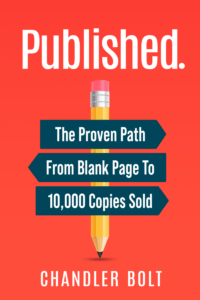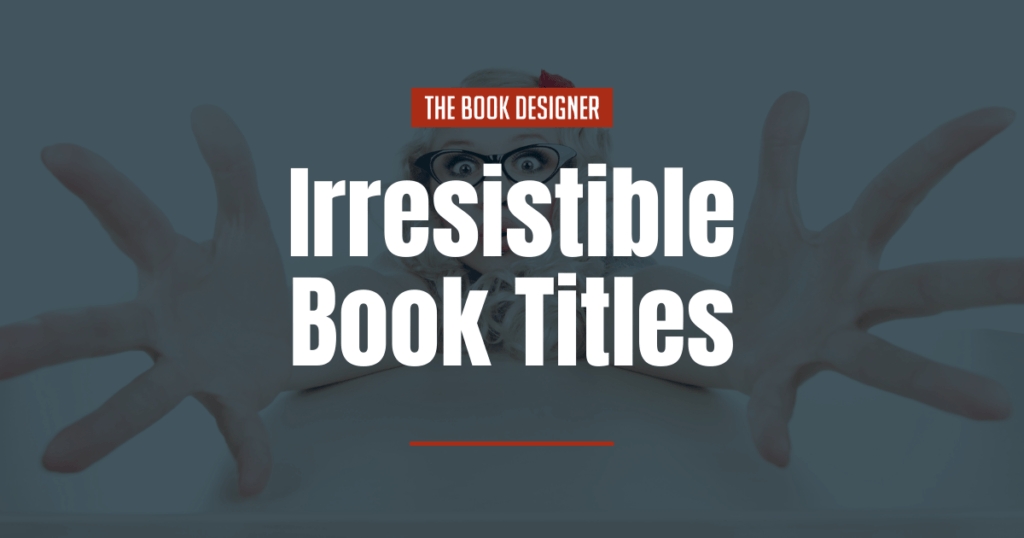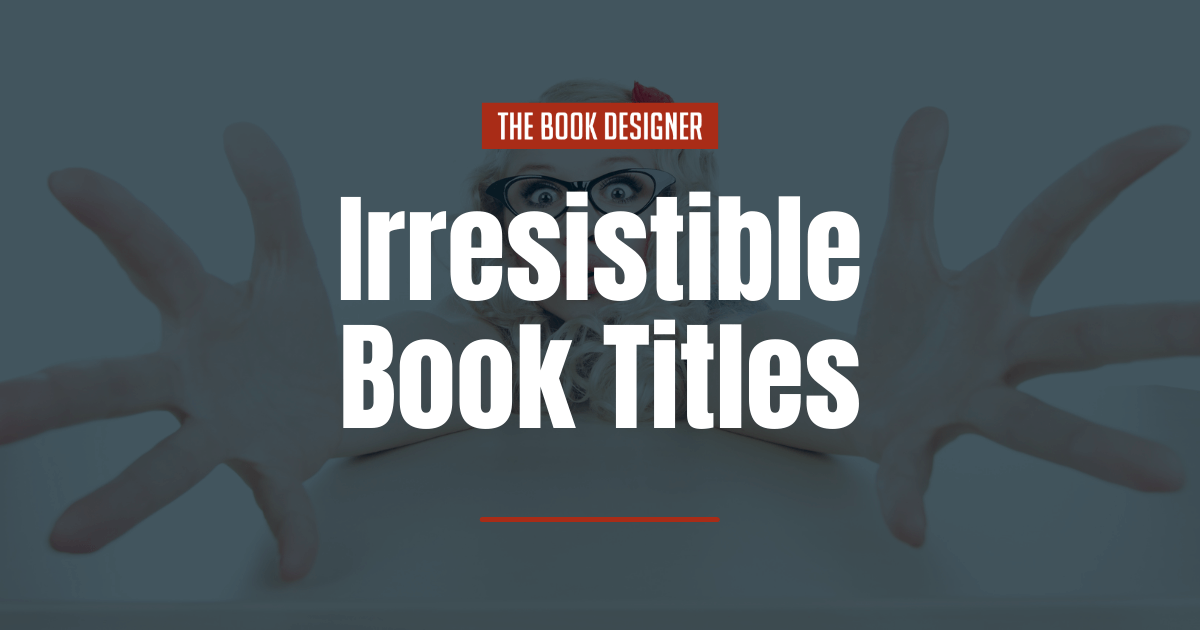Recently I gave a workshop on how authors can use email, and we talked about how crucial it is to learn to write good subject lines. And I’ve written here about the importance of learning to write headlines for your blog articles, and how to look at titles for nonfiction books from a search-optimized point of view.
In each case, if your subject line, headline, or title is boring, uninformative, or indecipherable, far fewer people will bother to read any further.
That’s why I was interested in Derek Doepker’s take on a “formula” that can help you come up with a book title that fulfills its main purpose: to appeal to the readers for whom the book was intended, catching their attention and compelling them to want to know more.
Here’s Derek’s formula for irresistible book titles in complete detail. Enjoy!
Table of Contents
Why the Right Title Is Essential For Book Sales
Imagine you’re standing in front of a shelf full of books on a topic you’re interested in—let’s say self-publishing. Will you start pulling each and every book off the shelf one by one to learn more about it, or will you quickly skim through the titles to see which one piques your interest?
Now imagine you’re an even busier online shopper who’s done a search for “self-publishing.” How likely is it you’re going to skip past any book whose title and cover don’t immediately hook you without giving it a second thought?
This is how the vast majority of book buyers shop, and what that means is this:
All the hard work you’ve done in creating your valuable book will go to waste if you don’t have a title that stops a book buyer dead in their tracks and hooks them in.
That’s not all. . .
As things get even more competitive in the world of self-publishing, unless you’re in a very small niche, you’re likely dealing with anywhere from hundreds to thousands of competing books, all fighting for attention.
In these cases, a “good” title isn’t enough. You need an irresistible title that, most importantly, is unique when placed next to other books in the genre.
This guide will show you the exact ingredients you need to create captivating book titles from scratch. You’ll get the A-B-C-D formula that creates powerful titles that practically force readers to check out your book; power words you can instantly add to your titles to make them more intriguing; and the only way to ensure you’ll have a winning title before publishing.
One quick disclaimer: Anytime I refer to title, I could be referring to the title and/or subtitle. In general, a title will give an overall theme of the book and may be somewhat vague. A subtitle might be longer and offer more details. This is also true for non-fiction books in the advice/how-to genres, although it’s not always the case for memoirs, biographies, or histories.

A = Attention—The First Step in a Sale
If you don’t first grab someone’s attention, nothing else you have to offer matters. They won’t discover how your book can change their lives if their eyes have jumped to another book, or if their minds are off thinking about what to make for dinner, or they’re so bored that they stop looking at books and decide to watch cat videos on YouTube instead.
Here’s the interesting thing. . .
What’s “attention-grabbing” depends largely on your target audience and the competition, and what other similar books they have seen.
If there’s virtually no competition, then you can have a very straightforward and to-the-point title, and it will work quite nicely.
20 Ways to Draw a Cat and 44 Other Awesome Animals is pretty much straight and to the point, and it works because—to the best of my knowledge—there isn’t an overwhelming number of books on drawing cats. Therefore, “ways to draw a cat” is attention-grabbing enough in a market without a ton of cat drawing books.
The more competition there is on a topic, the more you need to stand apart. If an author has a book on how to lose weight, can you imagine how many times people have seen the message “lose weight” in advertising? People have become numb to the words and skip right over them.
That’s why you often see books in competitive niches use one or more of the following five proven, attention-grabbing title formulas.
Proven Attention Grabbers
- Curiosity (as insider secrets)
- Surprise and Humor
- Controversy or Contrarian
- Specific or Powerful Benefit
- Novelty or Unique Mechanism
Curiosity
Curiosity is something every good non-fiction book title will create. After all, it takes some degree of curiosity for people to want to check out the rest of your book—which is the very point of your title. It is a natural byproduct of combining all parts of the A-B-C-D formula.
However, you can base your entire book title around generating massive curiosity when its theme is insider information or secrets.
Examples
- 50 Secrets of the World’s Longest Living People by Sally Beare
- I Shouldn’t Be Telling You This: Success Secrets Every Gutsy Girl Should Know by Kate White
- How to Get Your Ex Back Fast! Toy with the Male Psyche and Get Him Back with Skills only a Dating Coach Knows by Gregg Michaelsen
Surprise and Humor
Surprise and humor can be created by using absurdity, exaggeration, “inappropriate” language, or simply speaking something out loud that we can all relate to, but about which we might not be quick to talk about in public—just to name a few. I would suggest using humor if the overall tone of your book is humorous. Otherwise, it could backfire.
Examples
- The Best Cookbook Ever: With recipes so deliciously awesome, parties so incredibly mind-blowing, pictures so breathtakingly beautiful, menus so expertly crafted, and stories so heartbreakingly poignant that you will cry as you cook from it, and it will change your life forever by Eli Sussman
- Raise Your Hand If You Have Issues by Michael Baisden
- Living with Your Body and Other Things You Hate: How to Let Go of Your Struggle with Body Image Using Acceptance And Commitment Therapy by Emily K. Sandoz and Troy DuFrene
Controversial or Contrarian
A contrarian title is anything that goes against the grain of a commonly held belief. This almost always gets attention because it breaks a hardwired pattern of thought. It makes a person stop and say, “Wait! That’s not what I’m used to hearing!”
Examples
- You’re Broke Because You Want to Be: How to Stop Getting By and Start Getting Ahead by Larry Winget
- Goals Suck: Why the Obsession with Goal-Setting is a Flawed Approach to Productivity and Life in General by M.F. Stone
- Book Marketing is Dead: book promotion secrets you MUST know BEFORE you publish your book by Derek Murphy
Specific or Powerful Benefit
Which sounds more appealing; “sell a lot of books” or “sell 100 copies a day?” Or: “lose weight fast” vs. “lose 10 pounds in 10 days?”
Specificity is attention-grabbing because it gives your brain something concrete to latch onto, and as a side bonus, it is often novel when it’s a benefit that’s different from what other, competing books are offering.
The more specific and/or powerful you can make your benefit, without setting off people’s BS alarms, the better. We’ll cover some specific ways to enhance your specificity later in this article.
Examples
- The 10 Best-Ever Anxiety Management Techniques: Understanding How Your Brain Makes You Anxious and What You Can Do To Change It by Margaret Wehrenberg
- Younger Next Week: Your Ultimate Rx to Reverse the Clock, Boost Energy and Look and Feel Younger in 7 Days by Elisa Zied
- The Pound a Day Diet: Lose Up to 5 Pounds in 5 Days by Eating the Foods You Love by Rocco Despirito
Novelty or Unique Mechanism
A simple way to create novelty is to use words people in a genre aren’t used to seeing. Instead of “fat loss,” it might be “fat shred.” Instead of “sell more books,” it might be “book sales explosion.” Instead of “really delicious recipes,” one could use “dangerously delicious recipes.” Can you see how “dangerously” would grab attention because it’s not a word people browsing cookbooks are used to seeing?
A “mechanism” is a thing that gives you results. It is how the claim is achieved. It’s the “secret sauce(s)” behind what makes a benefit achievable.
Anytime you see “The XYZ” or “An XYZ” you’re dealing with a mechanism—and it’s a powerful way to come up with new words or phrases that people haven’t heard before, which, as you know, grabs attention.
This is why you often see “The XYZ diet” where there is some type of novel name, like the “ The 20/20 Diet” by Dr. Phil McGraw or “ The Belly Fat Cure” by Jorge Cruise. These words and phrases feel unique, grabbing a reader for that extra second to get them to pay attention to the rest of the book’s content.
It’s also common to make up a mechanism to add novelty to it—and this could be with an invented word or phrase. For instance, a “love language” enhances a relationship. “Mini habits” help you create a habit with ease. “A-B-C-D Formula” is a way to create book titles that sell. “Muscle confusion” is a phrase used to help sell the workout program P90X and differentiate it from other workout programs—even though the concept itself wasn’t necessarily new.
Common examples of generic mechanisms include tips, systems, blueprints, formulas, ways, and strategies.
Examples
- Brainfluence: 100 Ways to Persuade and Convince Consumers with Neuromarketing by Roger Dooley
- Mini Habits: Smaller Habits, Bigger Results by Stephen Guise
- The 5 Love Languages: The Secret to Love that Lasts by Gary Chapman
- Reader Magnets: Build Your Author Platform and Sell More Books on Kindle by Nick Stephenson
B = Believability—Your Foundation for Offering Benefits
Let’s say you saw a book called “How To Make A Million Dollars Overnight: The Fast And Easy Way To Get Rich Without Any Work.” While this is attention-grabbing due to a bold claim and something many people would obviously be interested in, it’s hard for most people to believe it. Many people may scoff off such a book without giving it a second thought, thinking either that they don’t believe it could really work, or that they don’t believe it could really work for them. If the claim is too big in the title, even if it’s true (I’m assuming you’d only make true promises as an ethical author), you could turn some people off before they get a chance to do further investigation.
Alternatively, if readers do believe in the promise but not that it would work for them and their circumstances, it also won’t work. This is why “How To Sell More Books” might not be convincing if the target reader assumes, “That probably involves a bunch of expensive marketing techniques I can’t afford.” This is why a title such as “25 Free Ways to Sell 100 Books a Day” might be far more believable.
The important thing here is not that one way is right or wrong, but that you must understand your specific target audience and their concerns. If a book was targeting already-successful authors making a lot of money, it wouldn’t need to address budget concerns.
The good news is believability can be built up mostly through the book description and positive testimonials. Your main job with the title here is to recognize the level of “jadedness” in your target audience, and not make claims that are so extraordinary that the majority wouldn’t believe them—keeping in mind there will always be some people highly skeptical of any claim.
This is why a title like Internet Business Shortcuts: Make Decent Money Online without Taking Years to Get There by Buck Flogging works well. In a market in which people have become rightly skeptical of claims of getting rich online overnight, toning it down to say “decent money” and “without taking years” is a realistic promise that avoids sounding overly hyped.
Tips for increasing believability
- Be specific: Any time you have a specific number or fact in the title, it will increase the perceived believability. “5-minute recipes” is more believable because you can measure it compared to “fast recipes.”
- Use a mechanism as covered earlier: When people get a sense that there’s a specific means to the positive outcome, such as a 7-step system or A-B-C-D formula, it makes it more believable.
- Use “I” statements if you’ve achieved something significant: “How I Make 5k A Month Selling Books” is more believable than “How To Make 5k A Month Selling Books.”
- Overcome potential objections: If there is a large objection with your audience that it may be too expensive, time consuming, complicated, or anything else that holds them back, you can address this in the title/subtitle with phrases like “without” or “even if.” “Sell more books without spending a dime.” “Sell more books even if you’re dead broke.” Note: This is only needed if it’s at the forefront of their mind. Keep in mind some objections can be handled in the book’s description.
- Use words that enhance believability: Like scientific, proven, guaranteed, effective, practical, and so on.
C = Care—Why A Reader Wants Your Book
The third part of the equation, care, means your title offers a benefit or promise that the reader cares about.
While this is the most obvious thing a title should provide, it can actually be deceptively hard to nail. That’s because as an author, you may believe your audience should care about something that they don’t yet see the benefit of. Learn to speak about what your target reader cares about, not what you believe they should care about.
Which of these do you care about more? “How To Turn Your Fans Into Your Promoters” or “The Ultimate Guide To Endless Passive Book Sales?”
Both of these books would say the same thing – having your fans promote your books for you. But the idea of “fans into promoters” takes a little critical thinking to see the benefit. Some people may say, “Yeah, that’s nice but not a big deal for me.” However, “make more book sales passively” might be more likely to stop people and make them say, “Yes! That sounds awesome! Tell me more!”
The way to know what people care about is to get to know your target audience and ask what their biggest challenge is. Then reflect that language back to them. This could be done through back-and-forth conversations, however it can also be done by simply reading online forums, reviews on similar books, and blogs where your target readers hang out.
What are the things you can safely assume almost everyone cares about? People generally want things that are easy, fast, superior, helps them avoid pain/failure/loss, complete (no missing pieces), enjoyable, and economical. Here are a few words that can be used for each:
Ease
- Effortless
- Easy
- Simple
Speed
- Instant
- Quick
- Now
Superior
- Best Way
- Top
- Most XYZ (Effective, Intelligent)
Pain Avoidance (What you don’t want)
- Mistakes – Example: 17 mistakes that are keeping you from being a bestselling author and how to fix them
- Failures
- Avoid – Example: 10 things you must avoid for…
Totality
- Complete
- Ultimate
- Total
Enjoyable
- Fun
- Feel-good
- Entertaining
Economical
- Cheap
- Affordable
- Inexpensive
- Value
Example
Instead of “5 Marketing Tricks To Sell More Books”
It could be…
- “5 Dirt Cheap Marketing Tricks To Sell More Books”
- “The 5 Most Effective Marketing Tricks To Sell More Books”
- “The Ultimate Guide To Selling Books”
- “5 Ways To Make Your Books Sell In A Hurry”
Do you think we can make this better? Of course!
We give them more details about the outcome. This is about specificity. Note: Don’t make claims you can’t back up. Only use things you can say with honesty.
- “5 Marketing Tricks I Used To Sell 1,013 Books This Week”
- “5 Marketing Tricks To Become A #1 Bestseller In Self-Help”
- “5 Book-Marketing Strategies That Cost $10 Or Less”
- ”5 Ways To Market Your Book To Bestseller In Less Than 5 Minutes A Day”
Then we can combine them.
- “5 Dirt Cheap Marketing Tricks To Sell 1,000 Books This Week”
- “The 5 Most Effective Marketing Tricks To Become A #1 Bestseller”
- “The Ultimate Guide to Marketing Your Books In 10 Minutes A Day”
D = Different—Why Is Your Book the Solution?
Finally, the last question on the reader’s mind is this: What makes this any different than other books out there? Just as importantly, what does this book tell me that I don’t already know?
Your title’s primary job isn’t to sell the book on the spot, although it’s great if you have such a great title that it’s all you need. Instead, it’s to generate enough curiosity or interest that it gets a browser to read more about your book where you can further build up their desire.
The formula for curiosity is this: Care + Uncertainty
Uncertainty is the feeling that, “maybe I don’t already know this.” Note that you don’t have to have new information. Rather, all you need is simply a new perspective, methodology, or way of putting things. Rarely do books offer completely new information; rather, they almost always offer a new way of looking at existing information.
The reason the example “How to sell more books” may not have triggered as much curiosity is because you might think to yourself, “I already know some ways to sell books. There may not be anything there that I don’t already know.”
Everything works together, though. So if I say, “How to sell a lot more books on a budget,” some people may say, “I know how to sell books, but not on a budget. I’m uncertain about that aspect and therefore a bit curious.” So while “on a budget” might be something people care about, it can also add to uncertainty. It all depends on the individual seeing it.
Complete beginners are uncertain about a lot of things. Therefore, in those markets, just talking about basic information like “how to quickly write and publish your own book” will generate curiosity. But if that was all that was said, it won’t necessarily be different enough to stand out from similar books. Check out this book’s title and promise:

Another common technique is the good old number list. “17 mistakes authors make” generates uncertainty because you’re not sure what those specific 17 mistakes are. You might be able to guess at them, but do you have the same 17? You’ll probably feel a bit uncertain. What if I said, “The #1 mistake authors make?” You could probably guess a few mistakes authors make, but do you know for sure if you’re aware of the #1 mistake? Since # lists enhance believability and create uncertainty, you can see why they’re used so often. This mechanism also creates uncertainty while enhancing believability.
The good news is that readers often buy multiple books on a topic, so the idea of competition is a half-truth. While you do have competition, you don’t necessarily have to be the only book a person buys on a topic. So your job isn’t to reinvent the wheel, but rather show the reader why your book is adding value to their life instead of being just another “me too” book on a topic.
If your book truly offers something unique and a fresh perspective, then you can use any of the following words to generate uncertainty.
Words That Create Uncertainty
- New
- Different
- Never Seen Before
- Strange
- Weird
- Unusual
- Unconventional
- Unique
- Secrets
- Breakthrough
- Cutting Edge
- Uncommon

6 Quick Titling Tips
Each of the following tips is optional. However, it makes a good reference guide to see if you can incorporate at least one of these things into your book title.
1. Use Title Templates
Title templates are a great way to jumpstart your book title ideas by following proven formulas.
Examples include:
How To. . .
How to Get Your Point Across in 30 Seconds or Less by Milo O. Frank
How to Get Your Ex Back Fast! Toy with the Male Psyche and Get Him Back with Skills only a Dating Coach Knows) by Gregg Michaelsen
The Best
The 10 Best-Ever Anxiety Management Techniques: Understanding How Your Brain Makes You Anxious and What You Can Do To Change It by Margaret Wehrenberg
301 Best Questions to Ask on Your Interview by John Kador
You Need (To Know)
What Works for Women at Work: Four Patterns Working Women Need to Know by Joan C. Williams and Rachel Dempsey
The 250 Power Words That Sell: The Words You Need to Get the Sale, Beat Your Quota, and Boost Your Commission by Stephen Schiffman
What To Do/Say When…
What to Do When You Can’t Get Pregnant: The Complete Guide to All the Options for Couples Facing Fertility Issues by Daniel Potter and Jennifer Hanin
What to Say When Things Get Tough: Business Communication Strategies for Winning People Over When They’re Angry, Worried and Suspicious of Everything You Say by Leonard S. Greenberger
ABC Like An XYZ
Speak Like a CEO : Secrets for Commanding Attention and Getting Results by Suzzane Bates
Steal Like an Artist: 10 Things Nobody Told You About Being Creative by Austin Kleon
Download a complete list of title templates at: https://ebookbestsellersecrets.com/titletemplates
2. Use “You” and/or “Your”
These are two of the most powerful words used in ad copy, and it’s just as relevant when naming a book title. You’ll notice the emotional difference between phrases like “The Top 10 Mistakes You’re Making” vs. “The Top 10 Mistakes People Make.” Pay attention to how many book titles incorporate these words.
3. Use Adjectives and Adverbs
Words like “top,” “best,” “fast,” “easy,” and so on both grab a reader’s attention and are good for long tail keyword targeting. Just don’t go overboard, or you can sound overly hyped up, unless that’s what you’re going for.
https://www.enchantedlearning.com/wordlist/adjectives.shtml (Note that these are in alphabetical order and make a great reference when trying to come up with alliteration.)
When appropriate, find synonyms that are more emotionally engaging using https://thesaurus.com.
Here are some examples of using synonyms:
- Great vs. Irresistible
- Easily vs. Effortlessly
- New vs. Cutting Edge
Adverbs are words that end in “ly” like “easily” and “effortlessly.” Can you feel a difference between “a simple method” and “a surprisingly simple method?” Note that one isn’t always better than another. These are things to experiment with. Remember you can change many words into adverbs by adding “ly” to the end.
4. Use Numbers
Using numbers and lists: “Top 10…” or “7 ways to…” are proven ways to grab attention. Numbers help convey the impression of being simplified or systematized.
- 50 Fitness Tips You Wish You Knew
- 23 Anti-Procrastination Habits
- Make Him Beg To Be Your Boyfriend In 6 Simple Steps
5. Use Proven, Perfect, System, Step-By-Step, Simple, Easiest, Best Ever, and more.
These are examples of what I call “comfort words” as they create certainty. They instill comfort that what you’re offering will actually work or be simple and easy enough a reader can understand and utilize it.
6. Use Alliteration
Alliteration is when the beginning of two words sound alike. “Simple steps” or “fifty fitness” are examples of alliteration. I would say approximately 50% of book titles have alliteration somewhere in them.
Getting Guaranteed Results
At this point, you may be feeling like you have a lot to work with and at times that can be slightly overwhelming.
Don’t worry! There’s a way to ensure you have a winning title. The first thing is to come up with a number of titles using one or more of the five attention-grabbing techniques. It will take a little practice at first.
The thing to keep in mind is that this is not about coming up with the one best title, ever. Did you know that big time publishers may test hundreds of book titles or book covers to determine which performs best? While you may not be at that level, wouldn’t it make sense to at least come up with a small handful of options to test?
The reason is that it’s ultimately not about what YOU like as the author—it’s about what resonates with your target audience. The only guaranteed way to determine what’s going to perform well is to survey your target readers for what they like best.
Some research methods include:
- Facebook groups
- Amazon m-turks survey – Fiverr gig of mine for that can be found here: https://ebookbestsellersecrets.com/fiverrsurvey
- Facebook ads with your title/subtitle ideas as the only changing variable and tracking click through rates.
Now that you know “What is a Good Book Title?,” here are your Next Steps
You now have a proven formula for creating irresistible book titles. While the formula may make sense to you intellectually at this point, keep in mind the best way to engrain this into your brain is to start looking at other great book titles, and ask, “How does this get my attention, make me believe in it, demonstrate value, and create a sense of uniqueness?”
Then start generating your own book titles without the pressure to make them good. In fact, give yourself permission to come up with horrible book titles as a game to see if you can add even just one of these elements to it to spice it up. With practice, you’ll gradually improve.
Finally, remember that a winning book title isn’t decided by you, but by your target reader. Run surveys and ask people for their opinions. Be willing to let go of what you think is a great title if it’s not what your readers are responding to. After all, your role is not to come up with the cleverest title, but to use a title to help your readers improve their lives.
When you click the link below, you’ll be redirected to a title generator page from our sister site, Selfpublishing.com:


Derek Doepker went from dead broke valet parker and aspiring musician to a multiple #1 bestselling author of books including Why Authors Fail. He’s the founder of ebookbestsellersecrets.com which features a variety of training courses on self-publishing success.
He created the training Hooks For Books: How To Create The Most Captivating Books Titles Ever Using Simple Psychology Tricks specifically to help non-fiction authors get an in-depth understanding of how to create non-fiction book titles that sell. He loves sharing his experience to help other aspiring authors get their message into the world.
Photo: bigstockphoto.com. Amazon links contain my affiliate code.



